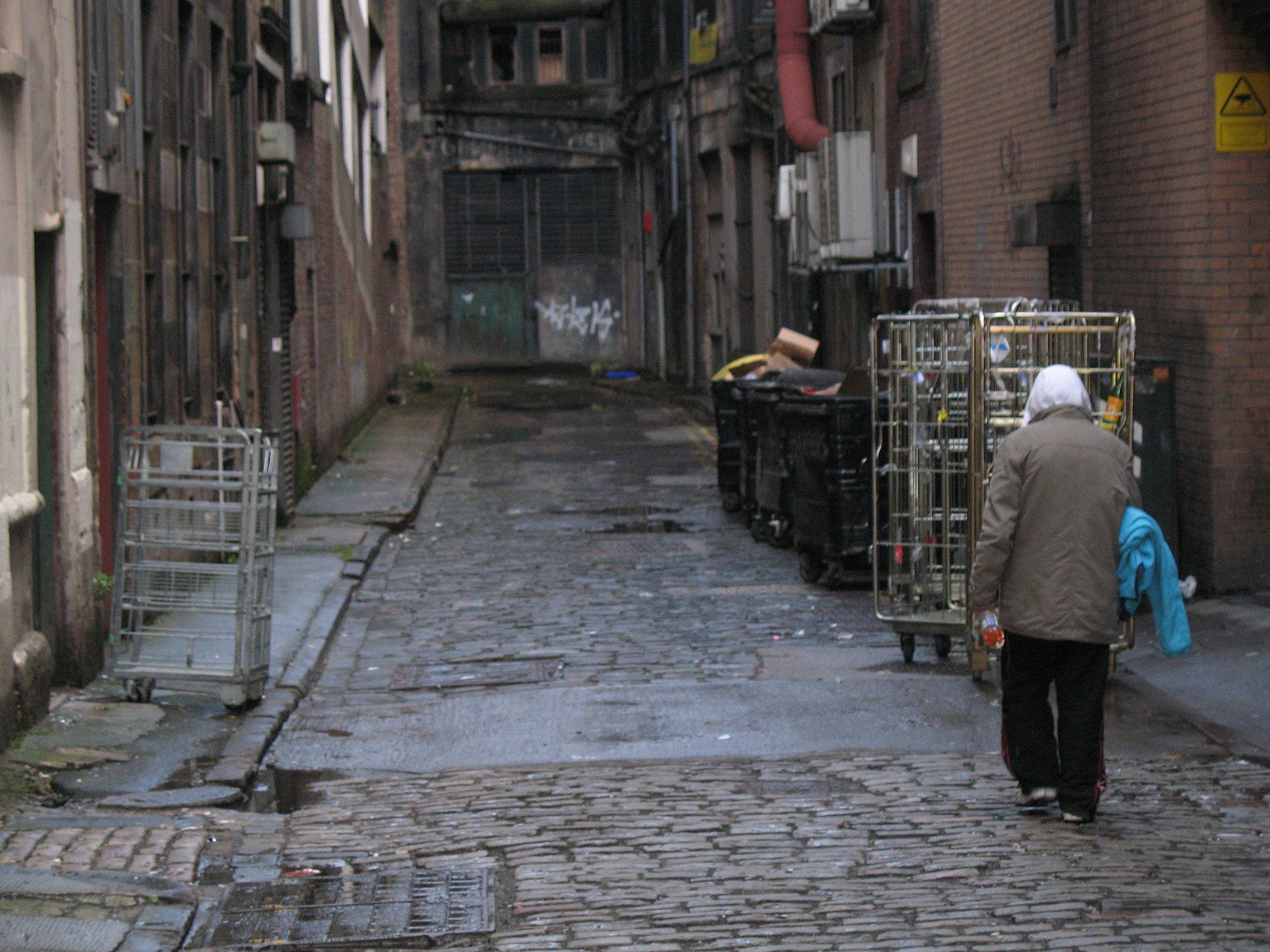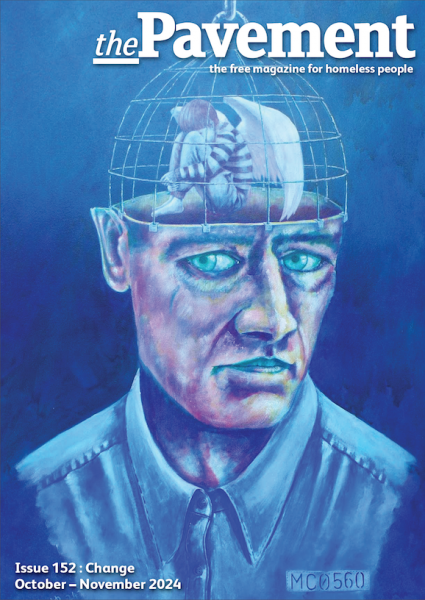
Established 2005 Registered Charity No. 1110656
Scottish Charity Register No. SC043760
DONATE
RECENT TWEETS
 Hundreds of people in Glasgow's city centre already sleep rough after being turned away from homeless services ©GiuloFarella for Creative Commons
Hundreds of people in Glasgow's city centre already sleep rough after being turned away from homeless services ©GiuloFarella for Creative Commons
Glasgow City Council has raised the alarm about the introduction of Universal Credit – due to be in place across the city within 18 months – which, it claims, will put its ability to provide homeless services at risk.
The concerns are raised in a paper due to be presented to the city’s Integration Joint Board next Wednesday. It reveals that the council has already racked up £144,000 in arrears from just 73 homeless Universal Credit claimants. Those receiving the benefit do not receive the full cost of temporary accommodation provided.
The council has already been working with the Scottish Housing Regulator of over a year because of its failure to provide temporary accommodation to all unintentionally homeless people, a legal obligation in Scotland. It now claims that under current Universal Credit proposals it will not be able to run a service that meets its statutory duties.
The paper notes that: “The city’s Homelessness Services is dependent on housing benefit/rental income for a significant percentage of its front line staffing to manage operational demand.”
It highlights that homeless people who have been put on to Universal Credit, often in error, are unable to return to Job Seekers Allowance with arrears now putting strain on a budget that already runs at a £1.4million annual deficit.
But it also claims that when the Universal Credit roll-out is completed in September 2018, services for homeless people, temporary accommodation and staff jobs will all be affected.
“The welfare reforms identified in this paper constitute a major risk to the delivery of statutory homelessness services in Glasgow, with particular concerns in relation to front line staffing, delivery of statutory services, provision of temporary furnished accommodation, which is also a statutory duty, and in relation to the existing recurring budgetary pressure of £1.4m,” it states.
The paper, which offers no solutions at this stage concludes: “Following on from the significant savings applied to budgets in the past 5 years, Homelessness Services can no longer absorb this level of impact and continue to operate a sustainable service that meets its statutory duties.”
Sandy Farquharson, director of Glasgow’s Marie Trust day centre, said the paper caused him “considerable concern” as he had previously been “totally unaware” of the long-term consequences of Universal Credit on homeless services.
“The consequences for the council so far for those people affected by homelessness who have already been transferred to Universal Credit in error are quite alarming,” he added. “There is no way the council can sustain this level of loss of income both now and in the future and deliver current services to those affected by homelessness.
“It is right and proper that the council is flagging up their concerns at this stage so that Government policy can be challenged at this stage and in the future.”
Shelter Scotland called for solutions to be found. Alison Watson, Deputy Director for Shelter Scotland, said: “By its own admission, Glasgow City Council is already turning people away who have a statutory right to access temporary accommodation. Raising the alarm like this must now be followed up with urgent action to ensure that funding remains in place for high-quality temporary accommodation.”
A Glasgow City Council spokesman said: “Welfare reform has already had a significant impact on our budget for homelessness services.
“The introduction of universal credit is placing further pressure on homelessness budgets and it is anticipated that delivery of these services will become increasingly challenging.
“We will continue to seek ways to mitigate the impact of these changes so that we continue to operate an effective service for those affected by homelessness.”
A DWP spokesman added: "One person without a home is one too many and we are investing over £500m to tackle homelessness and stop it happening in the first place.
"Local Authorities are best placed to understand the needs of their residents, that's why we will have provided them with around £1bn in funding by 2020 to support people transitioning to our reforms."
October – November 2024 : Change
CONTENTS
BACK ISSUES
- Issue 152 : October – November 2024 : Change
- Issue 151 : August – September 2024 : Being Heard
- Issue 150 : June – July 2024 : Reflections
- Issue 149 : April – May 2024 : Compassion
- Issue 148 : February – March 2024 : The little things
- Issue 147 : December 2023 – January 2024 : Next steps
- Issue 146 : October 2023 – November 2023 : Kind acts
- Issue 145 : August 2023 – September 2023 : Mental health
- Issue 144 : June 2023 – July 2023 : Community
- Issue 143 : April 2023 - May 2023 : Hope springs
- Issue 142 : February 2023 - March 2023 : New Beginnings
- Issue 141 : December 2022 - January 2023 : Winter Homeless
- Issue 140 : October - November 2022 : Resolve
- Issue 139 : August - September 2022 : Creativity
- Issue 138 : June - July 2022 : Practical advice
- Issue 137 : April - May 2022 : Connection
- Issue 136 : February - March 2022 : RESPECT
- Issue 135 : Dec 2021 - Jan 2022 : OPPORTUNITY
- Issue 134 : September-October 2021 : Losses and gains
- Issue 133 : July-August 2021 : Know Your Rights
- Issue 132 : May-June 2021 : Access to Healthcare
- Issue 131 : Mar-Apr 2021 : SOLUTIONS
- Issue 130 : Jan-Feb 2021 : CHANGE
- Issue 129 : Nov-Dec 2020 : UNBELIEVABLE
- Issue 128 : Sep-Oct 2020 : COPING
- Issue 127 : Jul-Aug 2020 : HOPE
- Issue 126 : Health & Wellbeing in a Crisis
- Issue 125 : Mar-Apr 2020 : MOVING ON
- Issue 124 : Jan-Feb 2020 : STREET FOOD
- Issue 123 : Nov-Dec 2019 : HOSTELS
- Issue 122 : Sep 2019 : DEATH ON THE STREETS
- Issue 121 : July-Aug 2019 : INVISIBLE YOUTH
- Issue 120 : May-June 2019 : RECOVERY
- Issue 119 : Mar-Apr 2019 : WELLBEING
- Issue 118 : Jan-Feb 2019 : WORKING HOMELESS
- Issue 117 : Nov-Dec 2018 : HER STORY
- Issue 116 : Sept-Oct 2018 : TOILET TALK
- Issue 115 : July-Aug 2018 : HIDDEN HOMELESS
- Issue 114 : May-Jun 2018 : REBUILD YOUR LIFE
- Issue 113 : Mar–Apr 2018 : REMEMBRANCE
- Issue 112 : Jan-Feb 2018
- Issue 111 : Nov-Dec 2017
- Issue 110 : Sept-Oct 2017
- Issue 109 : July-Aug 2017
- Issue 108 : Apr-May 2017
- Issue 107 : Feb-Mar 2017
- Issue 106 : Dec 2016 - Jan 2017
- Issue 105 : Oct-Nov 2016
- Issue 104 : Aug-Sept 2016
- Issue 103 : May-June 2016
- Issue 102 : Mar-Apr 2016
- Issue 101 : Jan-Feb 2016
- Issue 100 : Nov-Dec 2015
- Issue 99 : Sept-Oct 2015
- Issue 98 : July-Aug 2015
- Issue 97 : May-Jun 2015
- Issue 96 : April 2015 [Mini Issue]
- Issue 95 : March 2015
- Issue 94 : February 2015
- Issue 93 : December 2014
- Issue 92 : November 2014
- Issue 91 : October 2014
- Issue 90 : September 2014
- Issue 89 : July 2014
- Issue 88 : June 2014
- Issue 87 : May 2014
- Issue 86 : April 2014
- Issue 85 : March 2014
- Issue 84 : February 2014
- Issue 83 : December 2013
- Issue 82 : November 2013
- Issue 81 : October 2013
- Issue 80 : September 2013
- Issue 79 : June 2013
- Issue 78 : 78
- Issue 77 : 77
- Issue 76 : 76
- Issue 75 : 75
- Issue 74 : 74
- Issue 73 : 73
- Issue 72 : 72
- Issue 71 : 71
- Issue 70 : 70
- Issue 69 : 69
- Issue 68 : 68
- Issue 67 : 67
- Issue 66 : 66
- Issue 65 : 65
- Issue 64 : 64
- Issue 63 : 63
- Issue 62 : 62
- Issue 61 : 61
- Issue 60 : 60
- Issue 59 : 59
- Issue 58 : 58
- Issue 57 : 57
- Issue 56 : 56
- Issue 56 : 56
- Issue 55 : 55
- Issue 54 : 54
- Issue 53 : 53
- Issue 52 : 52
- Issue 51 : 51
- Issue 50 : 50
- Issue 49 : 49
- Issue 48 : 48
- Issue 47 : 47
- Issue 46 : 46
- Issue 45 : 45
- Issue 44 : 44
- Issue 43 : 43
- Issue 42 : 42
- Issue 5 : 05
- Issue 4 : 04
- Issue 2 : 02
- Issue 1 : 01
- Issue 41 : 41
- Issue 40 : 40
- Issue 39 : 39
- Issue 38 : 38
- Issue 37 : 37
- Issue 36 : 36
- Issue 35 : 35
- Issue 34 : 34
- Issue 33 : 33
- Issue 10 : 10
- Issue 9 : 09
- Issue 6 : 06
- Issue 3 : 03
- Issue 32 : 32
- Issue 31 : 31
- Issue 30 : 30
- Issue 29 : 29
- Issue 11 : 11
- Issue 12 : 12
- Issue 13 : 13
- Issue 14 : 14
- Issue 15 : 15
- Issue 16 : 16
- Issue 17 : 17
- Issue 18 : 18
- Issue 19 : 19
- Issue 20 : 20
- Issue 21 : 21
- Issue 22 : 22
- Issue 23 : 23
- Issue 24 : 24
- Issue 25 : 25
- Issue 8 : 08
- Issue 7 : 07
- Issue 26 : 26
- Issue 27 : 27
- Issue 28 : 28
- Issue 1 : 01
